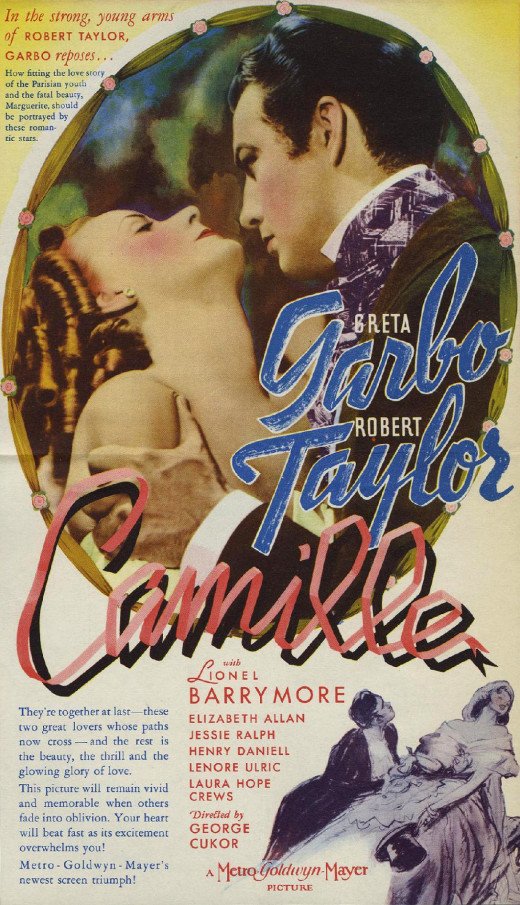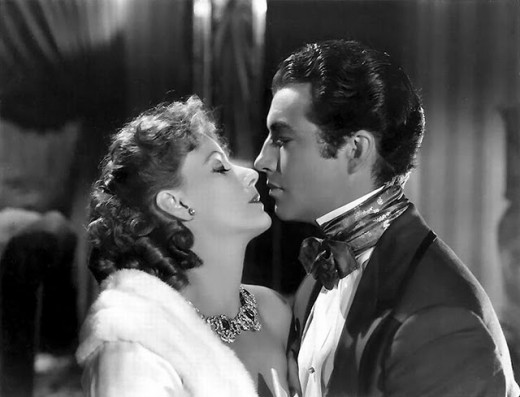Film Review: Camille

Background
In 1936, George Cukor released Camille, based off of the 1848 novel and 1852 play, La Dame aux Camélias by Alexandre Dumas, fils. Starring Greta Garbo, Robert Taylor and Lionel Barrymore, the film grossed $2.8 million at the box office.
Synopsis
Born into a low-class French family, Marguerite Gautier climbs the social ladder, becoming the Dame Camille in high society Paris. Though she is attracted a young man named Armand, his father convinces her to turn him down due to her past.

Review
While Camille is in no way a fun movie, it’s a great film that’s very well done, especially with how Camille and Armand develop through the film's progression. There’s no doubt that the pair is attracted to and wants to be with each other, but the reasons that Camille continues to rebuff Armand’s advances despite that attraction are quite selfless and shows how much she truly loves him. Armand’s father tells her that her lower class past and using her looks to get ahead in the upper crust of society will bring Armand down, ruin his future and the future of any possible children that the two might have. Since she wants what’s best for her beloved, she continues to reject him. However, since the truth won’t suffice, she has to make up reasons why she doesn’t want to be with him. It shows how much she really loves Armand and how much she cares about him that she will give up her chance at love with him to make sure he has a successful future.
At the same time, Armand may seem like a complete fool for continuing to go after Camille, even though she constantly rebuffs him with stupid reasons and excuses. In this case though, it shows how much he cares about her. At one point, she actually does tell him the truth about how she doesn’t want to mess up his future because of her past and he really doesn’t care what people think of him to be with her. He would rather give up being a notable name in the upper society of Paris than not be with her. Armand even goes so far as to visit Camille when she’s dying of Tuberculosis, a highly contagious disease, showing that he loves her so much that even his health is of no matter, just as long as he can see her. The film goes to great lengths to show how much the two love each other. While she’s looking out for his best interests, he doesn’t care about those interests because he’s not with her. It demonstrates that sometimes even true love will end tragically.
There’s no true villain in the film either. Though there are a few other women who try to draw Armand to themselves, none of them are really a true secondary love interest. The closest thing to a villain would be his father, whose motives are well intentioned. He really does want what’s best for Armand, even if the latter would rather throw it all away because of true love.
Though Camille is shown to truly love Armand because she doesn’t want to ruin his future by becoming attached to him, her character of selfless love only goes so far. It’s established that her finances are covered by a wealthy baron, which has complemented her making money from her looks. Yet, before Armand’s father convinces her otherwise, she’s willing to give up the Baron to be with Armand and on the surface that may seem like she’s willing to give up a wealthy lifestyle for love, but Armand is also fairly well off. What this means is: she’s not really giving anything up, rather leaving a significantly extravagant lifestyle for a less significant extravagant lifestyle. Though it's not as much as the baron dotes on her, it's not like she's choosing to be poor again.
the postings on this site are my own and don't necessarily represent WNI's positions, strategies or opinion
Awards & Recognitions
Bold indicates reception of award/recognition
Academy Awards
- Best Actress in a Leading Role (Greta Garbo)
National Board of Review, USA Awards
- Top Ten Films
- Best Acting (Greta Barbo)
New York Film Critics Circle Awards
- Best Actress (Greta Garbo)








